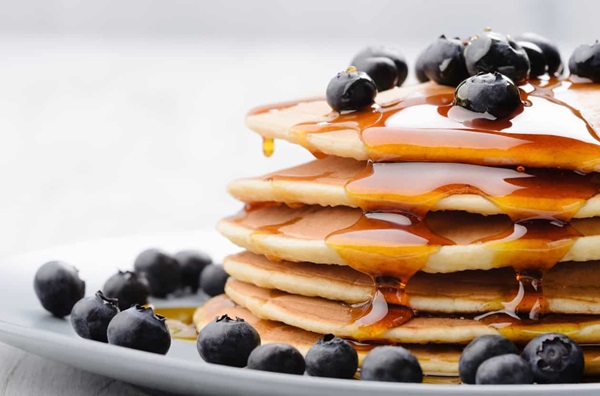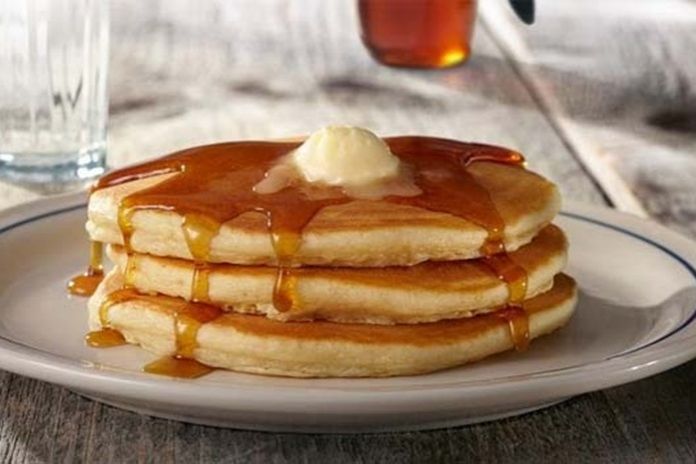National Maple Syrup Day is on December 17! This thick and flavorful condiment is as versatile as it is delicious. People love to drizzle it over everything from pancakes and eggs to salads and barbecues. On December 17, go ahead and pour it on your favorite dishes!
History of National Maple Syrup Day
People began producing maple syrup thousands of years ago in the northeastern United States. Indigenous peoples were the first to tap into the plentiful maple trees in the region.
Although the exact reasons and methods behind the initial extraction process remain unclear, maple sap undeniably became a crucial ingredient in many dishes.
Moreover, when European colonists arrived, they introduced maple syrup to Europe, where people quickly came to love both its taste and usefulness. Colonists favored it as a substitute for cane sugar, which had to be imported from the West Indies.
Similarly, Maple syrup’s ability to be used in both liquid and crystallized forms made it a valuable sugar source. The colonists’ extraction methods differed from those of the indigenous peoples, laying the groundwork for future improvements.
In addition, some maple trees might have experienced numerous changes in extraction methods over their lifetimes, as they can produce sap for more than 100 years!

Today, maple syrup isn’t just for chieftains or special occasions. People around the world enjoy it, and production has expanded to countries like Japan and South Korea.
Canada now produces most of the world’s maple syrup, with exports valued at over $270 million. While its rise may have been slow, maple syrup is now widely known and loved far beyond its northeastern origins.
Timeline of National Maple Syrup Day
| 1850s (The Flat Track) | The introduction of flat sheet pans in the sap boiling process allows for faster evaporation. |
| 1940s (Maple as a Staple) | Food rations during WWII give cause for northeasterners to substitute their normal sweeteners for maple syrup and maple sugar. |
| 1970s (Speeding Things Up) | A multitude of technological advances in this decade have increased the efficiency of the maple syrup production process. |
| 2000s (The Scent of Syrup) | First feared as an instance of chemical warfare, the mysterious appearance of the smell of maple syrup in the streets of New York City is found to originate from a nearby food processing factory in New Jersey. |
5 Interesting Facts About Maple Syrup
- Natural Sweetener: Maple syrup comes directly from the sap of sugar maple trees. It remains one of the few sweeteners produced from a single, natural source.
- Harvesting Season: Collectors gather maple sap in early spring, taking advantage of the temperature fluctuations between freezing nights and thawing days, which causes the sap to flow.
- Production Process: Boiling down maple sap requires a significant amount—about 40 liters (10.5 gallons) of sap to produce just 1 liter (1 quart) of syrup, due to the sap’s low sugar content.
- Grades and Tastes: Maple syrup comes in various grades, such as Golden Color with Delicate Taste and Very Dark Color with Strong Taste. The flavor changes based on when collectors gather the sap during the season.
- Nutritional Value: Maple syrup provides minerals and antioxidants, including manganese, zinc, and calcium. It also offers a lower glycemic index compared to refined sugar, impacting blood sugar levels more slowly.
Conclusion
In conclusion, National Maple Syrup Day on December 17 celebrates a versatile and beloved condiment with a rich history. From its origins with Indigenous peoples to its global popularity today, maple syrup has evolved from a local delicacy to a significant product enjoyed worldwide.
As you drizzle this sweet treat over your favorite dishes, remember its journey from the ancient practice of sap extraction to its current status as a global favorite. Whether you’re enjoying it for breakfast or adding it to your culinary creations, maple syrup continues to bring a touch of natural sweetness to our lives.
Frequently Ask Question
When is National Maple Syrup Day celebrated?
National Maple Syrup Day is celebrated on December 17 each year.
What makes maple syrup so versatile?
Maple syrup is versatile because it complements a wide range of dishes, from pancakes and eggs to salads and barbecues.
What is the history behind National Maple Syrup Day?
Maple syrup production began thousands of years ago with Indigenous peoples in the northeastern United States. European colonists later introduced it to Europe, where it became popular as a substitute for imported cane sugar. Over time, production methods improved, and today, Canada is the leading producer of maple syrup.
You may also like to read, National Oatmeal Muffin Day – December 19, 2024
